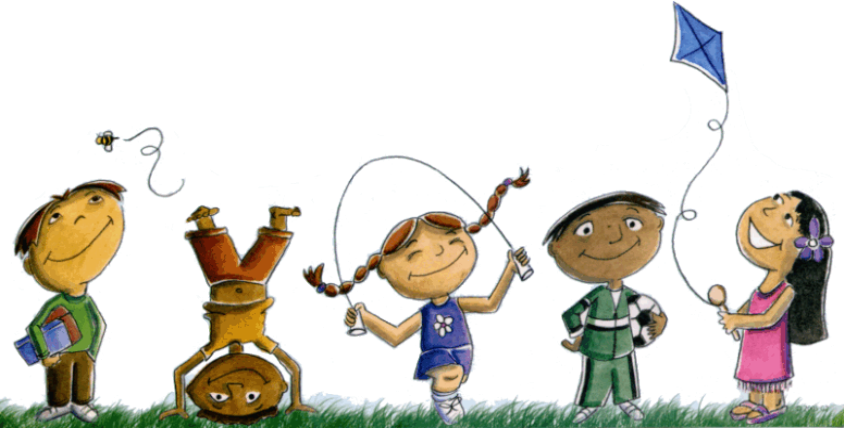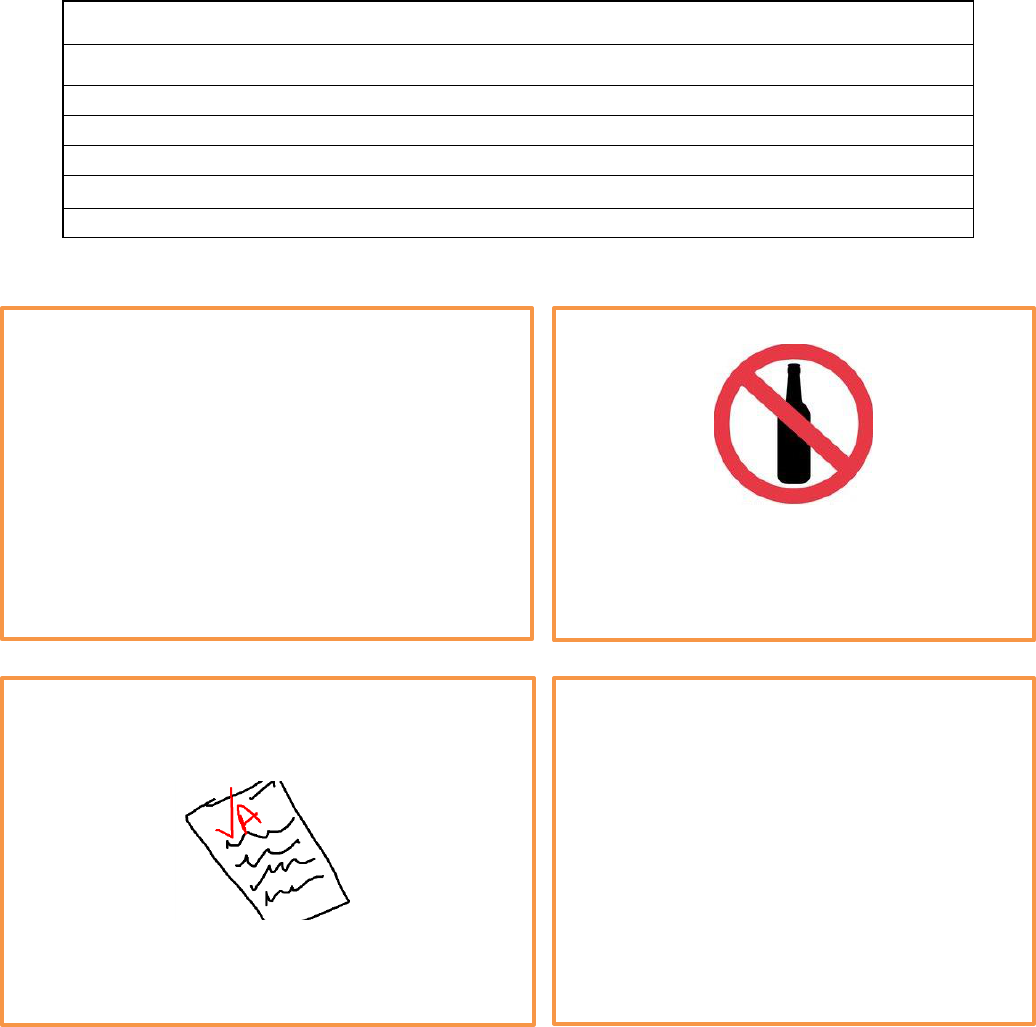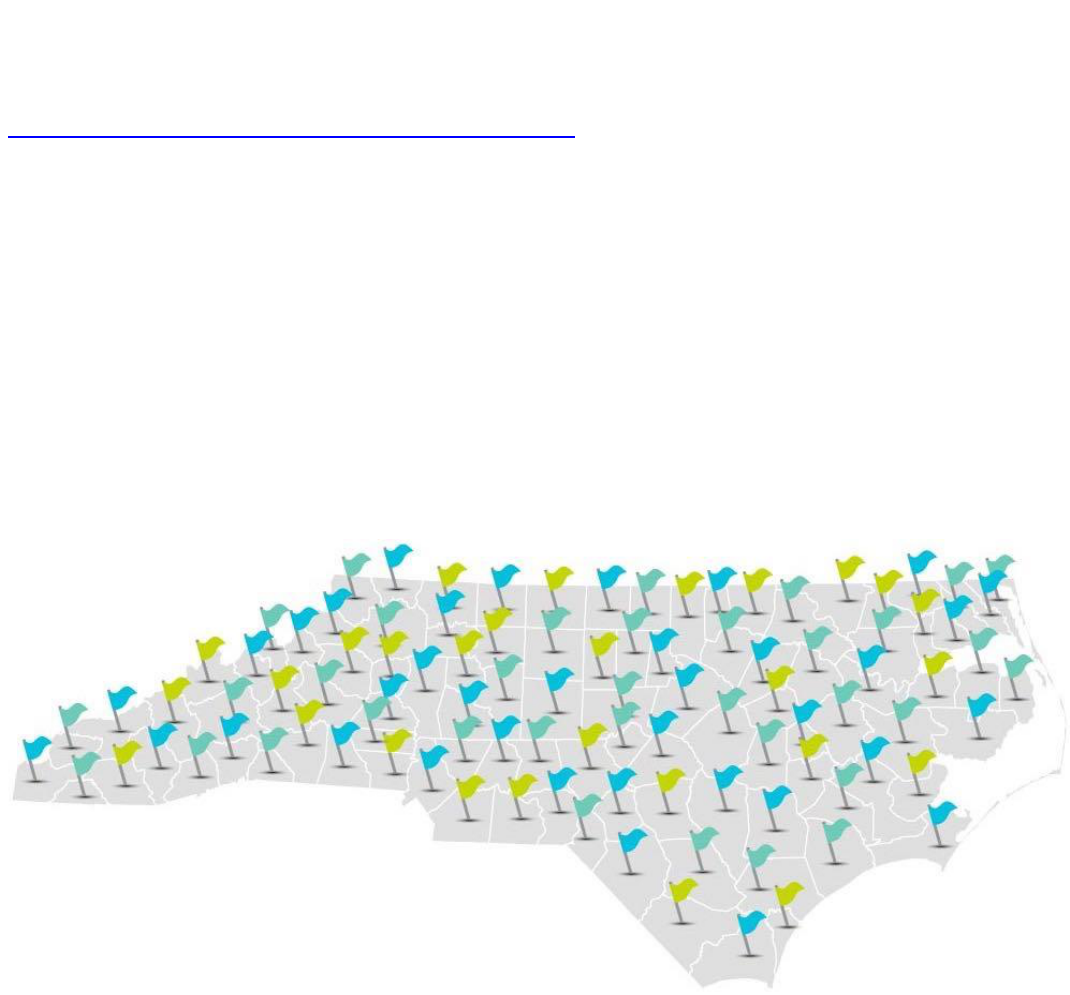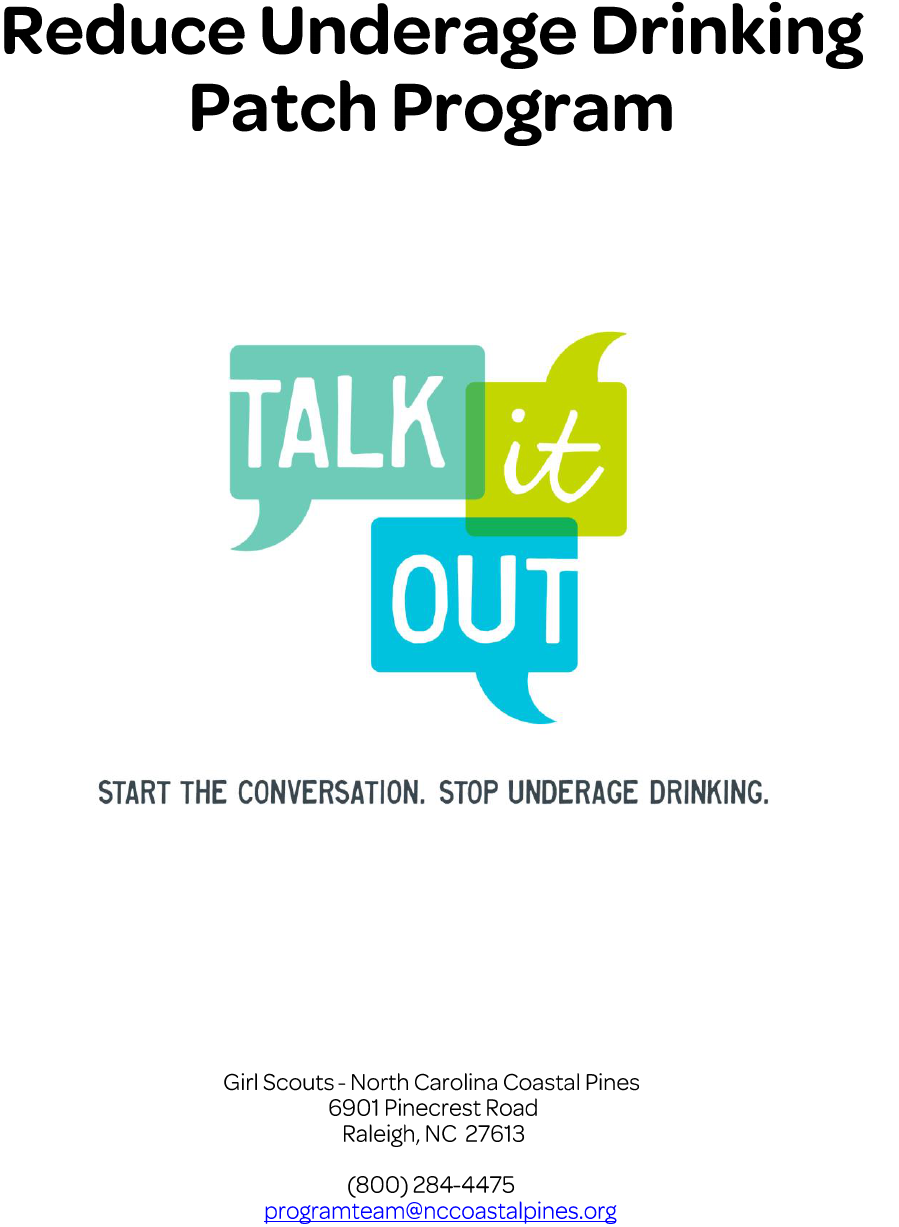
PG953/11-15
2
Talk It Out
Introduction
Underage drinking is a big issue in North Carolina.
Any time someone under 21 has a drink, that’s illegal. But
the problem goes well beyond breaking the law. There are
huge costs to underage drinking, starting with the dollars
and cents from things like car accidents, injuries, health
care expenses, and unintended pregnancies. There are
thousands of other crimes each year related to underage
drinking, and more than 75 deaths.
Underage drinking also leads to social and emotional
issues for the kids who drink and for their families and
friends. And drinking as a teenager can cause permanent
damage to the brain — affecting memory, impulse control,
and learning for the rest of a person’s life.
In spite of all these dangers, kids in North Carolina are
exposed to underage drinking at an early age — on
television, at the movies, online, and often in their own
schools.
The good news is that most kids understand the seriousness of this issue. Surveys in
North Carolina show that even in the face of peer pressure and popular culture, kids
want to hear from their parents — and say that if their parents talked more about the
dangers of underage drinking, it would help stop the problem.
That’s why the Talk It Out campaign was started.
We want to make sure that everyone in North Carolina recognizes how serious
underage drinking is. Even more important, we want parents to know that it’s up to them
to make a difference in their kids’ lives.
And that’s where you come in.
Educate yourself. Educate your family.
Through this patch program, you can take the lead in learning about the realities of
underage drinking. You can share what you learn with your parents and family
members. And you can make sure they know about all the tools available to build strong
relationships and keep kids from turning to alcohol in the first place.
Impacts of underage drinking
are enormous.
Underage drinking can kill.
It can leave permanent scars
on growing brains.
It can lead to other dangerous
behaviors.
It’s linked to serious mental
health problems.
It’s a serious legal issue for
parents and children.

PG953/11-15
3
Talk It Out Activity Requirements
Girl Scout Juniors, Cadettes, Seniors, and Ambassadors: Must complete Activity #1
and at least 6 of the other Activities.
1. Talk It Out Quiz: Identify six impacts of underage drinking mentioned on the Talk It
Out website: www.talkitoutnc.org. Ask a parent/family member to research these
impacts with you. Take the Student and Parent Talk It Out quiz and see how much
you learned about the problem of underage drinking. Obtain an adult family
member/troop leader signature.
2. Website Scavenger Hunt: Hunt around on the Talk It Out NC website to answer ten
questions. (Attached)
3. Peer Pressure Response: Imagine your school principal has rolled out a contest to
address peer pressure at your school. Create a drawing or craft that illustrates one
good sign of peer pressure. (Attached)
4. “If → Then” Scenarios: Draw two scenarios showing how a teen’s life could
develop with and without underage drinking. (Attached)
5. Family Pledge: Create a pledge that will remind you of how important it is to keep
the lines of communication open with your parents. (Attached)
6. Safe Word: Determine a Safe Word with your family that you will use if you are in
trouble or feel uncomfortable. Once you’ve decided on a word, draw a picture that
represents how having a Safe Word makes you feel. (Attached)
7. School News Reporter: Interview an enforcement officer to learn more about the
legal consequences of underage drinking. Write a news story about the law and
legal consequences of drinking alcohol underage. (Attached)
8. Coalition Community: Learn about the coalitions and statewide partners on the
Talk It Out website. Determine which ones might be located in your community. With
a parent/family member, contact one of these partners and learn how you and your
family can get involved with their efforts. (Attached)
9. Commercial Conversation: Watch all six Talk It Out commercials. Talk about them
and how they make you feel. Then, write a paragraph about the commercial that had
the biggest impression on you. Explain why it was powerful and whether it will help
you avoid underage drinking.
10. Conversation Starters: With a parent/family member, identify and learn about all
eight Talk It Out Underage Drinking conversation starters. Pick one and use those
quotes to start an open and honest discussion. On an index card, write a paragraph
on what you and your parent/family member learned. Obtain parent signature.
11. Underage Drinking In The News: With a group of girl scouts, use the Internet to
find news articles about underage drinking. Talk about these stories and how they
make you feel. How would you feel if you knew the person in the story? How would
your friends and family feel if the article was about you? Write a paragraph
explaining which emoji embodies your emotions.
Note to Troop Leaders: We believe our role at Girl Scouts is to help girls develop self-confidence and good decision-making skills
that will help them make wise choices in all areas of their lives. Parents or guardians make all decisions regarding program
participation that may be of a sensitive nature. Consistent with that belief, Girl Scouts – North Carolina Coastal Pines directs
volunteer leaders to notify parents in writing of any local program that could be considered sensitive.

PG953/11-15
4
Talk It Out Activity #1:
Teen and Parent Quiz
Talk It Out surveys show that kids want their parents to talk with them more often about
the dangers of alcohol. Let’s find out how much you and your parents know about the
dangers and consequences of underage drinking.
Quiz:
I. Take the Student Talk It Out Quiz. Without using the Internet or looking
at the quiz answers, see how many of these questions you can answer
correctly. Once completed, grade yourself using the Talk It Out Quiz
Answer Key. Using red ink, circle the answers that were wrong. Fill in the
total number right and total number wrong on the student quiz page.
II. Ask a family member/troop leader to take the Adult Family
Member/Troop Leader Talk It Out Quiz. Without using the Internet or
looking at the quiz answers, see how many of these questions they can
answer correctly. Once this adult has completed the quiz, you will grade
the answers using the Talk It Out Quiz Answer Key. Using red ink, circle
the answers that were wrong. Fill in the total number right and total
number wrong on the family member/troop leader quiz page.
III. With the family member/troop leader present, compare quiz answers. Are
there questions you both got wrong? If so, list those questions on the
Answer Key Sheet. Together with the adult, go to the Talk It Out website
www.talkitoutnc.org and find the answers. Have a conversation about the
answers to those questions and write down what you discussed. Write
down why you believe both you and the parent got that answer wrong on
the quiz.
IV. Both you and your family member/troop leader must sign the document
stating that you completed the activity as directed.
Assignment completion date: _______________
Signature (student — first name and last initial)
_____________________________________
Signature (family member/troop leader) ____________________________________
Note to Parents: We believe our role at Girl Scouts is to help girls develop self-confidence and good decision-making skills that
will help them make wise choices in all areas of their lives. Parents or guardians make all decisions regarding program
participation that may be of a sensitive nature. Consistent with that belief, Girl Scouts – North Carolina Coastal Pines directs
volunteer leaders to notify you in writing of any local program that could be considered sensitive.

PG953/11-15
5
Talk It Out Activity #1:
Student Quiz
1. In North Carolina what is the average age a child takes his/her first drink of alcohol?
________
2. North Carolina middle school students say if ___________ talked to them more
often about underage drinking, it would help stop the problem.
3. 94% of North Carolina students say underage drinking is a problem. ______True
________False
4. The human brain isn’t fully developed until about age 25. ____True _____False
5. The legal drinking age in the United States is _______years old.
6. If a teen uses alcohol before his or her ________ is fully developed, it can keep
good judgment and impulse control from properly developing.
7. Alcohol can damage the memory and learning areas of the adolescent brain.
______True ________False
8. Underage drinking will not hurt a teen’s developing brain.
_______True _________False
9. If you use a fake ID to buy alcohol you could:
a. Lose your license for 1 year
b. Have to perform Community Service
c. Have a permanent criminal record
d. All of the above
10. Talk It Out is a resource for parents to start talking to their kids about the dangers
of:
a. Skydiving
b. Alcohol
c. Speeding
Student quiz results
Total number correct: _____________
Total number incorrect: _____________

PG953/11-15
6
Talk It Out Activity #1:
Family Member/Troop Leader Quiz
1. In North Carolina what is the average age a child takes his/her first drink of alcohol?
________
2. North Carolina middle school students say if ___________talked to them more
often about underage drinking, it would help stop the problem.
3. 94% of North Carolina students say underage drinking is a problem. ______True
________False
4. The human brain isn’t fully developed until about age 25. ____True _____False
5. The legal drinking age in the United States is _______years old.
6. If a teen uses alcohol before his or her ________is fully developed, it can keep
good judgment and impulse control from properly developing.
7. Alcohol can damage the memory and learning areas of the adolescent brain.
______True ________False
8. Underage drinking will not hurt a teen’s developing brain.
_______True _________False
9. If you use a fake ID to buy alcohol you could:
a. Lose your license for 1 year
b. Have to perform Community Service
c. Have a permanent criminal record
d. All of the above
10. Talk It Out is a resource for parents to start talking to their kids about the dangers
of:
a. Skydiving
b. Alcohol
c. Speeding
.
Family member/troop leader quiz
results
Total number correct:
_____________
Total number incorrect:
_____________

PG953/11-15
7
Talk It Out Activity #2:
Website Scavenger Hunt
The Talk It Out NC website is full of important information on how alcohol impacts
adolescents and why underage drinking is dangerous. A lot of research has taken place
in North Carolina that helps us understand the adolescent brain and the effects of
alcohol on it. Visit talkitoutnc.org/Use-Your-Head to fill in the blanks in the statements
below.
1. Underage drinking can “wire” the brain for _______________________.
2. Even low levels of alcohol have a negative impact on _________, organizing,
managing time, paying ___________ and inhibiting inappropriate behaviors.
3. Drinking alcohol inhibits __________ function and slows reaction time – which is
why it’s so difficult and dangerous to __________ after drinking.
4. The ________________ is the part of the brain that is key for memory and
learning and Some of the most serious alcohol-related ___________________
during adolescence happens here.
5. Studies show over and over that _____________ behavior and
_________________ can delay the initiation of alcohol consumption.
6. Drinking alcohol can cause a ___________ in brain activity.
7. Alcohol slows down ________ activity, and the negative effect of alcohol lasts far
longer in a teenager’s brain than in an adult’s — up to ______ weeks.
8. The ___________ someone starts, the greater the chances he or she will have
___________ use problems in their lifetime.
9. Alcohol affects learning more in adolescents, and also interferes with other
“_________ health” behaviors, undoing the benefits of good __________ habits.
10. Alcohol affects the ________________ brain differently than it affects the adult
brain — because the human brain isn’t fully developed until about age ______.

PG953/11-15
8
Talk It Out Activity #3:
Peer Pressure
Peer pressure is the feeling that school someone your own age is pushing you toward
making a bad choice or a good choice. Kids in middle and high school — and their
parents — told us that there is a tremendous amount of “negative” peer pressure on
teens and young adults. All peer pressure isn’t bad. You and your friends can support
each other and positively “peer pressure” each other to do things that will improve your
health and make you feel good about yourself and your decisions; for example: avoiding
alcohol.
• Use your creativity to show two examples of peer pressure—one negative and
one positive—related to underage drinking. The negative example can be a
teenager trying to convince a friend to drink. The positive example can be a
teenager encouraging a friend to resist the temptation and to make the good
decision not to drink underage. Or you can come up with your own example!
• You can draw a phone screen with a text message conversation, a picture of
friends talking, write a poem or short story, or more. The more creative you are,
the better.
PG953/11-15
9
Talk It Out Activity #4:
“If → Then” Scenarios
Research shows that underage drinking can have dangerous immediate and long-term
consequences. Because the brain isn’t fully developed until age 25, when teenagers
drink underage, their brain responds to the alcohol differently than an adult brain. You
can learn all about the impact of alcohol on the adolescent brain by visiting
TalkItOutNC.org/use-your-head. Review this information; you’ll need it to complete this
activity
In this activity, you will draw two scenarios showing how a teen’s life could develop with
and without underage drinking. You can show whether a teenager graduates from high
school, attends college, makes good decisions, get her dream job, etc. The first
scenario would show the life as though the teenager didn’t drink alcohol underage. The
second scenario would show the life as though the teenage did drink alcohol underage.
Use the words “If” and “Then” to show how one decision can impact something else.
Check out the next page for an example.
Instructions:
• Create 2 different scenarios on 5x8 index cards or 8.5 x 11 paper.
• Draw two different scenarios as described above, indicating clearly which
scenario is which.
• Each scenario can have pictures alone, or can include words to clearly
communicate what is being portrayed.
• Be creative in your design!
• Have a discussion with your family member or troop leader after completing the
two scenarios. Write a brief paragraph for each scenario on an index card
describing what you learned, how you felt, and which scenario you would prefer.
These must be included as part of the assignment.
Assignment completion date: _______________
Signature (student — first name and last initial) ____________________________
Signature (family member/troop leader) ___________________________________

PG953/11-15
10
Continued—Talk It Out Activity #4:
“If → Then” Scenarios
Topics for Scenarios
High School Graduation
College Acceptance Letter
Decision Making
Job Interview
Grade on Test
Teenager attends party where alcohol is served
Example: Scenario
Scenario #1: [Title]
Date: [_________]
Participants: [name of child, family
member/troop leader]
Girl Scout Troop Information: [ ___________]
IF…
A teenager attends party where alcohol is
served but chooses to not drink and,
instead, goes home to study for an
upcoming test.
THEN...
The teenager gets an A on her test.
[Brief Paragraph]

PG953/11-15
11
Talk It Out Activity #5:
Family Pledge Contest
A pledge is a formal promise or serious commitment to do something — or not do
something — for a reason that it important to you. Through the Talk It Out campaign,
we’re encouraging our entire community to make a pledge to help reduce the number of
underage drinking incidents.
How can you spread the word? Let’s say your favorite pop artist will be hosting a family
concert in your area. She/he will be holding a contest to find the best Talk It Out Family
Pledge to help reduce underage drinking. The pop artist will be picking the winner of the
contest and will highlight your pledge at the upcoming concert.
Using pop star creativity, come up with a Family Pledge that will remind you of how
important it is to keep the lines of communication open with your parents. The family
pledge can be a catchy phrase, poem, song, etc. Make it easy for both kids and parents
to remember the pledge. Most important, create a pledge that both you and a
parent/troop leader will sign as a commitment to help reduce
underage drinking in the state of North Carolina.
Potential Pop Artist List (use one of these or come up
with your own)
Taylor Swift Ariana Grande
Selena Gomez One Direction
Justin Bieber Demi Lovato
Example Pledge
As a family within our community
As parents with an influence on our children
As young adults who recognize the dangers of underage drinking
We, as a family, pledge
To remain alcohol free until age 21
To hold each other accountable for our actions
To focus on our health and safety
To follow all rules established by our family, our school and our community
To be honest and open with our parents, coaches and community members
To set a positive example for everyone around us

PG953/11-15
12
Talk It Out Activity #6:
Safe Word
Sometimes we get uncomfortable based on our surroundings. Maybe the people you
are with are doing things that you don’t agree with such as experimenting with drugs or
alcohol. When this happens, the best thing you can do is to get out of the situation, but
sometimes that can be awkward.
That’s where a “Safe Word” can come in handy. You and your
parents should have a Safe Word that means, “I am
uncomfortable and I need your help.” When you text your family
member that Safe Word, they should call you immediately, find
out where you are, and come to pick you up. No questions asked.
For this activity, sit down with your family and determine a Safe
Word. It can be something silly or something serious, but it should
be a word that you will all remember.
Once you’ve decided on a word, draw a picture that represents
how having a Safe Word makes you feel.
Talk It Out Activity #7:
School News Reporter
Your role in this activity is to act as a school news reporter. You’ve been assigned to
write a news story about the law and legal consequences of drinking alcohol underage.
• Schedule an interview with an enforcement officer to learn more about the legal
consequences of underage drinking. (This could be a school resource officer,
deputy sheriff, local police officer, alcohol law enforcement officer, or ABC
enforcement officer.)
• Interview can be conducted in person or over the phone.
• As the reporter, come up with a list of 10 questions to
ask during the interview, and write down the answers
to each question.
• Make sure you get the name of the officer and the
enforcement community where he or she is assigned.
• Once you complete the interview, write a news story
about the underage drinking law in North Carolina.
• Make sure you include your first name, last initial, and
Girl Scout troop information.

PG953/11-15
13
Talk It Out Activity #8:
Coalition Community
Talk It Out is supported by a group of organizations that offer outreach and prevention
education. This group is called the Coalition. Coalition members represent a broad
range of community groups (local, state, national) who are interested in the subject of
reducing underage drinking and share a desire to change the culture in North Carolina
around underage drinking.
Your role in this activity is to research the coalitions in your community
(http://www.talkitoutnc.org/working-together/coalitions/). Specifically focus your efforts
on finding a coalition partner that focuses on underage drinking outreach and
prevention. Write a report on the coalition partner, and share ideas on how you would
volunteer your time to help the coalition partner extend its outreach. Make sure you
include your name and Girl Scout troop information.
Some examples include:
• Durham Together for Resilient Youth
• Edgecombe Nash Coalition on Alcohol and Drugs
• Orange Partnership for Alcohol and Drug Free Youth
• TeenFest
• Wilson County Substance Abuse Coalition

PG953/11-15
14
Talk It Out Activity #9:
Commercial Conversation
Talk It Out created three sets of commercials that aired on TV and social media over the
past few months. You can view the commercials at:
https://www.youtube.com/user/TalkItOutNC/videos
The commercials are called:
• Feeding Time
• Fussing Over
• Alex
• Sarah
• Lungs
• Ventilator
These commercials can be scary and hard to watch, but they show the realities of
underage drinking. With a parent or troop leader, watch all six videos. Talk about them
and how they make you feel. Then, write a paragraph about the commercial that had
the biggest impression on you. Explain why it was powerful and whether it will help you
avoid underage drinking.
Talk It Out Activity #10:
Conversation Starters
Talking about underage drinking to an adult may be awkward. But the more you talk, the
easier it gets. This activity will help you start the conversation with a parent/troop leader,
but it will also help the parent/troop leader start the conversation with you.
Check out the conversation starters from Talk It Out: http://www.talkitoutnc.org/wp-
content/uploads/2014/09/Conversation-Starters.pdf
With a parent/troop leader, identify and learn about all eight Talk It Out Underage
Drinking Conversation Starters. Pick one and use those quotes to start an open and
honest discussion. On a 5x8 index card, write a paragraph on what you and your
parent/troop leader learned. Obtain parent/troop leader signature.

PG953/11-15
15
Talk It Out Activity #11:
Underage Drinking In The News
With a group of other Girl Scouts, use the internet to find news articles on stories related
to underage drinking from the past year. Start by exploring articles from North Carolina
and expand to other states if necessary. You should each find a different article. Spend
some time reading about your article and then share it with the group.
As a group, talk about these stories and how they make you feel. How would you feel if
you knew the person in the story? How would your friends and family feel if the article
was about you? Pick which of the emojis below represent your feelings and write a
paragraph explaining why.

PG953/11-15
16
Talk It Out Activity #1:
Quiz Answers
1. 14
2. Parents
3. True
4. True
5. 21
6. Brain
7. True
8. False. Alcohol can hinder brain development.
9. D
10. B
DISCUSSION Activity:
_________________________________________________________
_________________________________________________________
_________________________________________________________
_________________________________________________________
_________________________________________________________
_________________________________________________________
_________________________________________________________
_________________________________________________________
_________________________________________________________
_________________________________________________________
_________________________________________________________
_____________________________________________________
PG953/11-15
17

